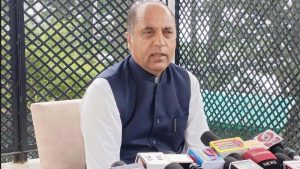How Modi Can Become A True Reformer

Founder of Divya Himachal & Author of ‘Why India Needs the Presidential System’

GST, demonetisation, and selling Air India might be bold development initiatives but they are hardly fundamental reforms of India’s governance. Modi would do better by implementing the following desperately needed improvements in our system of government.
Empower local governments
Indian cities are growing out of control and offer a pathetic quality of life. It’s because local city governments are powerless and unaccountable. State governments have circumvented the spirit of the 74th Amendment by not devolving powers to mayors and their councils. This can be fixed by directly transferring powers to municipal bodies, restructuring their constitutions, making them self-sufficient, and providing them directly elected mayors.
* True reforms take courage. A quality Modi is certainly not short of is bravery. And in that might be India’s best hope.
A private member bill to this effect is already introduced in the Lok Sabha by Dr. Shashi Tharoor, Congress MP. I urge the Modi government to pass that bill. It reduces fragmentation of leadership at local levels, improves decentralisation, and enhances responsibility.
Passing a private member bill would be an important and easy reform in itself. No Opposition bill has passed in Parliament since 1970. It would restore Parliament’s dignity and reduce partisanship.
Make the judiciary accountable to the people
Indians are routinely denied justice due to horrible delays and corruption in our court system. It is due to two fundamental problems: overcentralisation, and lack of transparency in the appointment of judges. Both can be remedied by involving people’s representatives, not the governments, in holding courts accountable.
Modi can implement a system whereby judiciaries at both central and state levels propose changes in courts, and continue nominating judges through their collegiums. Then their recommendations would be approved by corresponding legislatures, the Rajya Sabha or Vidha Parishads/Sabhas. This would be akin to the US Senate’s role in the American judiciary.
The government’s effort to pry open the judiciary with the NJAC failed because it pitted two executive powers against each other. Effective checks in governance require legislative oversight, not government oversight. Besides, a commission with government representatives overseeing the judiciary only replaces one opaque system with another. As Alok Prasanna Kumar, a scholar at Vidhi Center for Legal Policy, has written, “the NJAC incorporates all the drawbacks of the collegium system with merely cosmetic changes.”
Restore parliamentary oversight
India’s legislatures have become useless. Governments pass the laws they want while the Opposition can only disrupt proceedings or walk out. This has led to poor quality of laws and corruption. The remedies suggested by PRS Legislative Research, a think tank, are many: allowing Parliament to convene itself; empowering the Opposition to set some agenda; strengthening the committee system; ensuring accountability of intelligence agencies, etc.
* If Modi implemented just three fixes, Parliament’s fundamental function of overseeing government would be largely restored.
But if Modi implemented just three fixes, Parliament’s fundamental function of overseeing government would be largely restored. One, require all parliamentary committees to hold televised public hearings. Two, repeal anti-defection laws that restrict MPs and MLAs from voting against their party’s wishes, on bills other than no-confidence motions. Constitutional expert Madhav Khosla has said “the constraint prevents the legislature from performing one of its principal functions: scrutiny of the executive.” And three, give legislatures the power to approve government’s nominees for key positions, such as the chief of the CBI and the Election Commission.
Restore presidential powers
In India majorities routinely run amok once in power because there is no check over their actions. The presidency was designed to restrain them, but the much stronger office of the Prime Minister began diminishing it from the start of the republic. Contrary to the Constituent Assembly’s intentions of establishing an exalted President, the office was reduced to a mere rubber stamp by the Emergency -era 42nd Amendment. It compels the President to do as advised by PM.
Modi must remove these shackles wrongfully placed by Indira Gandhi on the office of the President by allowing it some discretionary powers. It is time to finally have that Instrument of Instructions describing presidential powers that B.R. Ambedkar once promised to add in the Constitution, but later reneged without explanation.
Abolish President’s Rule
Indians suffer lousy governance on the ground because our state governments are not truly accountable. They have overlapping responsibilities with the Centre and they depend too much on its largesse. But what hurts the state governments’ accountability to the people the most is their arbitrary dissolution by the Centre through the imposition of President’s Rule. Even after two decades of the Supreme Court ruling (Bommai 1994) that a state government’s legitimacy must be tested on the floor of the house and not by the Centre, the practice continues. In the most recent example of arbitrary imposition of President’s Rule, Arunachal in 2016, the court chastised the Modi government for “humiliating the elected government.” It’s time President’s Rule was abolished. As Rajeev Dhavan, senior Supreme Court advocate, has written, “If Union governance can do without President’s Rule, so too the states.”
Enact electoral reforms
Indians are not electing good leaders. It is due in a large part to the lack of transparency in the selection of candidates and the sources of their funding. In this area of fundamental reforms Modi seems to be heading the wrong direction. Nasim Zaidi, the outgoing CEC, has just blasted his government for recent changes in political funding laws, calling them “a retrograde step” that has “vitiated rather than improve transparency.”
The Election Commission itself has been pitching a number of electoral reforms for more than two decades. The Supreme Court directed the government more than three years ago that it must provide funding for VVPAT voting machines with paper trails.
But if Modi imposed just three conditions on India’s political parties—1) practice internal democracy; 2) select candidates through primary elections; and 3) release audited financial statements—he would truly reform our electoral politics. Given his hold on his own party, Modi would do well by beginning these practices first with the BJP. True reforms take courage. A quality Modi is certainly not short of is bravery. And in that might be India’s best hope.
विवाह प्रस्ताव की तलाश कर रहे हैं ? भारत मैट्रीमोनी में निःशुल्क रजिस्टर करें !
Keep watching our YouTube Channel ‘Divya Himachal TV’. Also, Download our Android App











